Brief
Oct 23 2018

Nigeria nutrition profiles
Nigeria has recently made progress toward strengthening policies and programs in support of maternal, infant and young child nutrition (MIYCN). However, progress has been limited to specific states—and creating strong plans for implementation of new policies remains a challenge.
Brief
Oct 01 2018
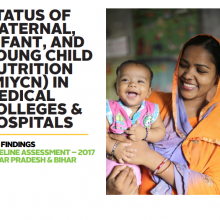
Status of maternal, infant, and young child nutrition (MIYCN) in medical colleges and hospitals: Baseline assessment (2017) in Uttar Pradesh and Bihar
Despite a favorable policy environment for maternal, infant, and young child nutrition (MIYCN), frontline delivery of critical MIYCN interventions has been a sustained challenge in India’s public health nutrition programs.
Brief
Jul 24 2018
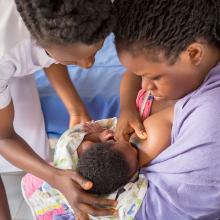
Findings from the Lancet Breastfeeding Series: Implications for health, social, and economic development in Nigeria
This brief summarize the global research on breastfeeding and its implications for Nigeria. The benefits of breastfeeding go beyond individual health. Breastfeeding impacts the country’s social and economic development and has implications for reaching national and global health targets.
Brief
Jul 24 2018
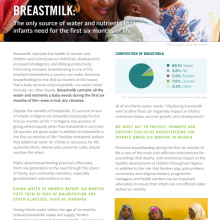
Exclusive breastfeeding: The only source of water and nutrients that infants need for the first six months of life
This advocacy brief makes the case for the importance of exclusive breastfeeding, aims to sensitize policymakers on the value of exclusive breastfeeding and policies/programs that ensure mothers/caregivers do not offer infants any water for the first six months of life.
Brief
Jul 24 2018
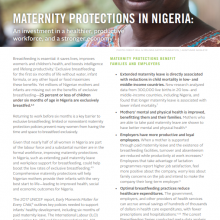
Maternity protections in Nigeria: An investment in a healthier, productive workforce and a stronger economy
This advocacy brief is part of efforts to improve maternity protections to increase exclusive breastfeeding rates, health outcomes, and economic growth and development in Nigeria.
Brief
Oct 15 2017
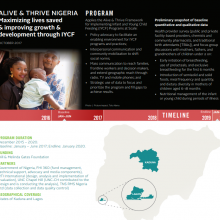
Maximizing lives saved & improving growth & development through IYCF in Nigeria
This information card shares a preliminary snapshot of quantitative and qualitative data from a health provider survey (public and private facility-based providers, chemists and community pharmacists, and traditional birth attendants), and focus group discussions with mothers, fathers, and grandm

